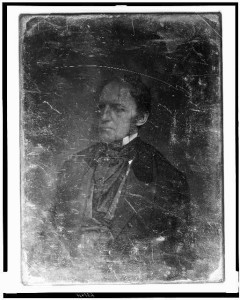I thought this was a pretty interesting juxtaposition from 150 Februaries ago. A southern newspaper criticized the North for not being merciful enough in its war effort and then criticized George McClellan for not using or knowing how to properly use all the resources at his command – Virginians don’t feel any terror at his name.
From the Richmond Daily Dispatch February 19, 1863:
…
A lesson for Lincoln.
The Yankee historian, Prescott, in his History of the Conquest of Peru, says that the monarchs of that country, in carrying on war, “allowed their troops to commit no unnecessary outrage on persons or property. ‘We must spare our enemies,’ one of the Peruvian princes is quoted as saying, ‘or it will be our loss, since they and all that belongs to them must soon be ours.’ It was a wise maxim, and, like most other wise maxims, founded equally on benevolence and prudence.”
The Gorilla Administration at Washington may learn a lesson of both humanity and prudence from the sovereigns of semi civilized Indians, more than three centuries ago. Perhaps the complacent manner in which the historian criticises the ferocity of the Spaniards, in their efforts to convert and conquer, may be somewhat moderated by the examples of greater ferocity than that even of Spaniards, which has been furnished since his history was written by the invading zealots of his own Massachusetts, in the midst of the idolized nineteenth century.
General McClellan.
There must be an awful dearth of military genius in the United States, when the restoration of McClellan to the chief command of the Army of the Potomac is urged by leading Northern journals as the only means of crushing the rebellion. If ever a man had been tried in the balances and found wanting, it is that same G. B. McClellan. Old Wingfield Scott, after being allowed only three months and fifty thousand men, was thrown overboard because he did not succeed in his “On to Richmond;” whilst McClellan, with a whole year for preparation, and a hundred and fifty thousand men, was whipped out of the Peninsula like a thieving bound, and yet his friends complain because he was removed, and insist that nothing but his restoration will restore “the Union.” If the Union leans upon G. B. McClellan, it leans upon a broken read. Whatever confidence his own men may repose in him after his Peninsula experience, there is no terror in his name to the dwellers upon the Chickahominy.
William Hickling Prescott (May 4, 1796 – January 28, 1859)
was an American historian and Hispanist, who is widely recognized by historiographers to have been the first American scientific historian. Despite suffering from serious visual impairment, which at times prevented him from reading or writing for himself, Prescott became one of the most eminent historians of 19th century America.
“Prescott’s work has remained popular and influential to the present day, and his meticulous use of sources, bibliographical citations and critical notes was unprecedented among American historians. [1]
Prescott, grandson of Bunker Hill’s William Prescott, would probably appreciate that the Dispatch appear to have accurately pulled text from his history of Peru (see Project Gutenberg).
- [1]Gardiner, C. Harvey (1969). William Hickling Prescott. Austin, Texas: Texas University Press. 142↩

